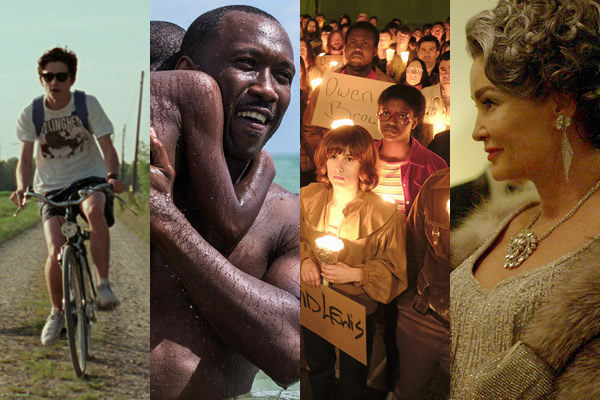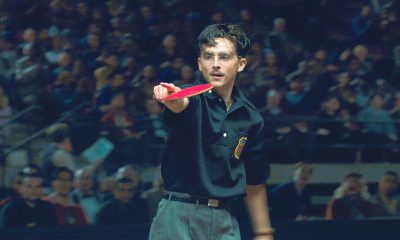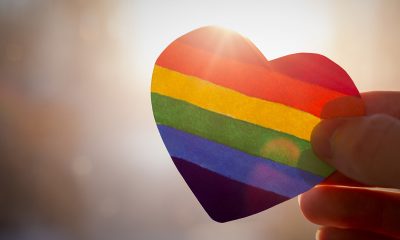a&e features
YEAR IN REVIEW: Top 10 pop culture stories of 2017
Epic Oscar mistake, Bette and Joan return in wild, wacky year
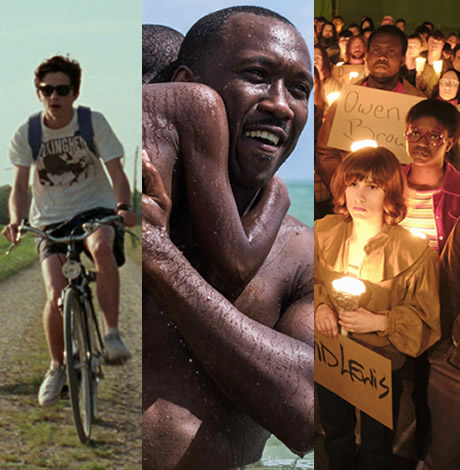
10. Aaron Carter comes out, gets busted for pot
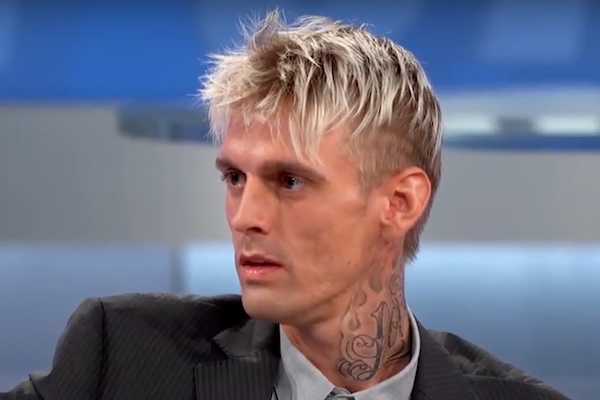
Aaron Carter
(Screenshot via YouTube)
Pop singer Aaron Carter, at the time 29 though he’s since turned 30, came out as bisexual in an open letter posted on Twitter in August.
“There’s something I’d like to say that I feel is important for myself and my identity that has been weighing on my chest for nearly half of my life,” Carter writes. “This doesn’t bring me shame, just a weight and burden I have held onto for a long time that I would like lifted off me.”
The star revealed he has been attracted to both genders since he was 13. He also shared that he had a sexual experience with another man when he was 17. Carter claimed that Madison Parker, his girlfriend at the time, broke up with him when he told her he was bisexual. Parker denied his sexuality was the reason for their spilt. He also said that his older brother Nick Carter had not reached out to him since he came out.
Carter brought his struggles with drug addiction, plastic surgery and his family on a tumultuous September episode of “The Doctors.” On the show, Carter learned he weighed only 115 pounds at 6 feet tall. He said he feared his weight loss was due to being HIV-positive. However, he tested negative for all STDs. His drug test revealed he tested positive for marijuana, Benzodiazepines (Xanax) and opiates (hydrocodone). After initially refusing to go to rehab on the show, Carter entered rehab in October and was released in December.
9. Milo Yiannopoulos goes down
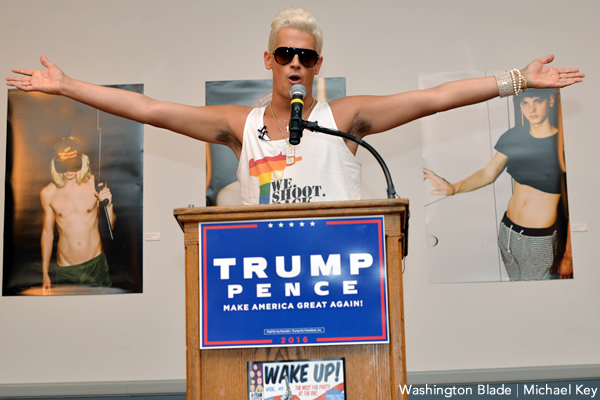
Milo Yiannopoulos (Washington Blade photo by Michael Key)
Milo Yiannopoulos’ swift descent from rising alt-right media personality to a defamed journalist shunned even from his own conservative community was peppered with controversy.
The year started out promisingly for the British political commentator who secured an autobiography book deal with Simon & Schuster and was invited as a guest on “Real Time with Bill Maher.” He kicked off a university speaking engagement tour which drew numerous protesters to University of California, Berkley. The protest became violent as protesters refused to let Yiannopoulos, who has made racist, misogynistic, transphobic and xenophobic remarks, to speak at the university. President Donald Trump even weighed in on Twitter threatening to cut the school’s federal funding for not allowing free speech.
Yiannopoulos’ success came to a halt when an old interview clip surfaced of him saying that sexual relationships between 13-year-old boys and adult men could be positive. His comments caused him to lose his job as senior editor for Breitbart News, to have his book deal with Simon & Schuster revoked and to be disinvited from the Conservative Political Action Conference.
Despite the negative press, Yiannopoulos tried to keep his career afloat. His publishing company Dangerous Books published his book “Dangerous.” Yiannopoulos closed out the year on a personal note marrying his boyfriend, identified only as “John,” in Hawaii.
8. ‘Call Me By Your Name,’ ‘Tom of Finland’ among year’s best films
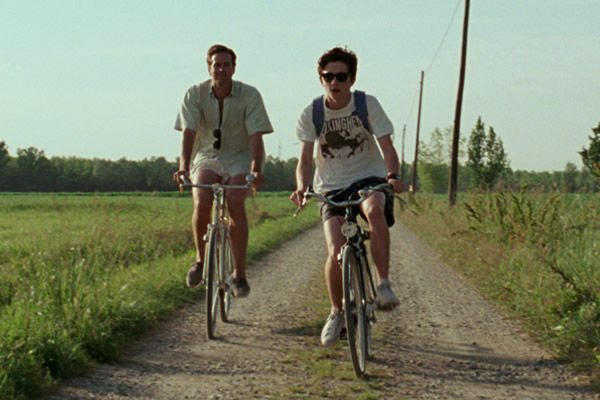
A scene from ‘Call Me By Your Name.’ (Photo courtesy Sony Pictures Classic)
It was a strong year for LGBT-themed movies but two especially stand out — “Tom of Finland” and “Call Me By Your Name.”
“Tom,” a Finnish biographical drama directed by Dome Karukoski, stars Pekka Strang as Touko Laakosenen, better known as the titular artist who specialized in mid-century homoerotic art. The film inspired a Tom of Finland renaissance of sorts with books and an extensive line of home products like shower curtains and throw pillows featuring Tom art.
“Call Me By Your Name,” a leisurely paced gay romance story between a 24-year-old intern (Armie Hammer) and the 17-year-old son of his employer (Timothee Chalamet) in Italy circa 1983, has drawn strong reviews for its taste and restraint.
“(Director Luca) Guadagnino and his actors emphasize tenderness and feeling capturing the magic of first-time dalliance in a way that makes it seem, if not wholly innocent, at least wholesome,” a Blade critic wrote.
It’s up for three Golden Globe Awards including nods for both its leads.
7. Season 9 of ‘RuPaul’s Drag Race’ makes ‘herstory’
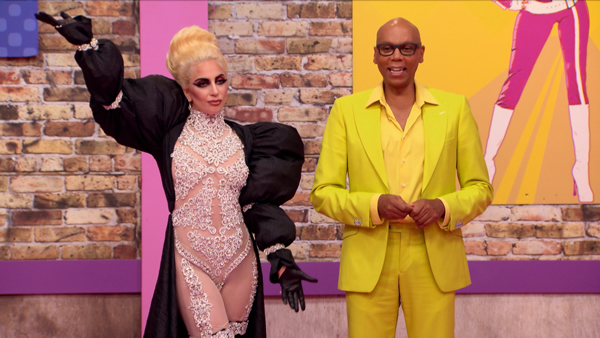
(Image courtesy VH1)
It was a banner year for “RuPaul’s Drag Race” in several ways. Debuting in March on new home VH1, the queens went apeshit when Lady Gaga walked into the work room and was featured as the guest judge.
Seeming to genuinely enjoy herself throughout the episode, Gaga helped series regulars Michelle Visage, Ross Matthews and Carson Kressley assess the queens’ interpretations of classic Gaga looks.
It turned out to be an unusually dramatic season, though. Latina diva Valentina emerged early on as a strong contender but was sent packing on episode nine after pissing off Ru for initially declining to remove a veil during the lip-sync against Debbie Downer Nina Bo’nina Brown. She said later she was in shock and hadn’t bothered to learn the words to the song, which all the queens are given in advance should they land in the bottom two.
The drama continued, though, on perhaps the bitchiest reunion episode of the series’ entire run with several queens calling out Valentina on her fake charm.
The finale, despite featuring no clear standout winner, went to Sasha Velour who bested Peppermint, Shea Coulee and Trinity Taylor for the title of America’s Next Drag Superstar.
RuPaul won his second consecutive Emmy Award for hosting.
6. ‘Wonder Woman’ lassos boffo box office
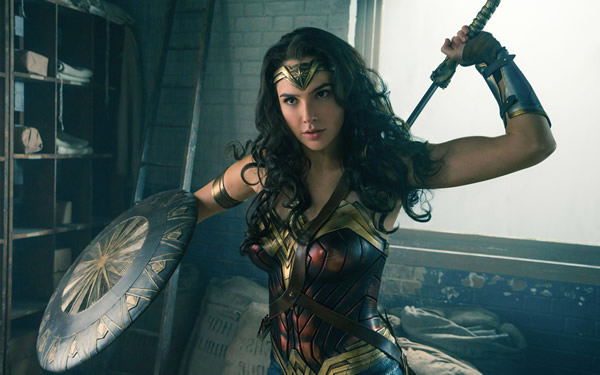
Gal Gadot (Photo courtesy Warner Bros. Pictures)
Although she’d been seen in 2016’s “Batman v. Superman: Dawn of Justice,” Wonder Woman finally got her own film this year with a June release starring Gal Gadot as the titular character and winningly helmed by Patty Jenkins (“Monster”) who won universal praise for her effort.
Filmed over a six-month period starting in November 2015 (development started in 1996), it set numerous box office records. It was the fifth highest-grossing superhero film in the U.S. and the 20th highest-grossing film ever stateside. It made more than $800 million internationally and is the best-ranked superhero film on Rotten Tomatoes. The American Film Institute called it one of the best 10 films of 2017.
Gadot plays the Amazon princess Diana, a highly trained fighter who’s been raised on the hidden island of Themyscira by her mother Queen Hippolyta (Connie Nielsen). The island’s security is breached when American pilot Steve Trevor (Chris Pine) crashes his plane on the island.
The Blade said it was “packed with gripping action sequences but also leavened with generous doses of comedy and deepened with serious considerations about the horrors of war and mankind’s capacity for both love and hatred.”
5. ‘Feud’ revives complicated partnership of Davis, Crawford
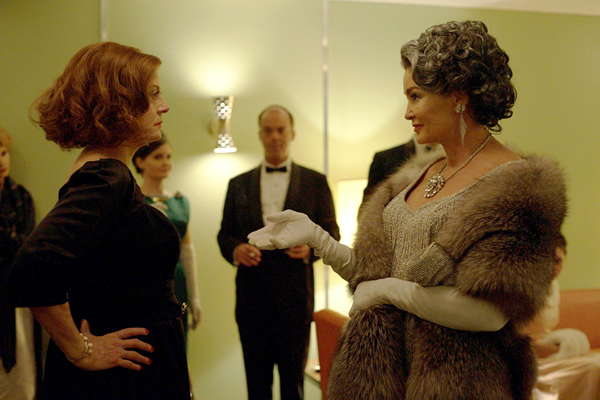
A scene from ‘Feud.’ (Photo courtesy Warner Bros. Pictures)
“Feud,” an FX series from Ryan Murphy, devoted its maiden season of eight episodes to the rivalry of Bette Davis and Joan Crawford, co-stars in the 1962 cult classic “Whatever Happened to Baby Jane.”
Jessica Lange starred as Crawford and Susan Sarandon played Davis. Both were nominated for Emmys, though the show won none of the 10 Primetime Emmys for which it was nominated (it won two Creative Arts Emmys). The series was praised for its period detail and grand, sweeping recreations of pivotal moments such as a long tracking shot showing Lange walking backstage at the 1963 Academy Awards.
Though declining somewhat in ratings after a strong start, the series fared decently overall. Its debut was the most-watched program on FX that week.
The series had an unexpected coda with Olivia de Havilland, a real-life friend of Davis who replaced Crawford in their planned follow-up “Baby Jane” movie “Hush … Hush Sweet Charlotte,” sued the creators claiming in a lawsuit filed a day before her 101st birthday that she was inaccurately portrayed and her likeness was used without her permission. Catherine Zeta-Jones played her in the series.
A second season of 10 episodes devoted to Charles and Diana will premiere in 2018.
4. ‘When We Rise’ draws mixed reviews
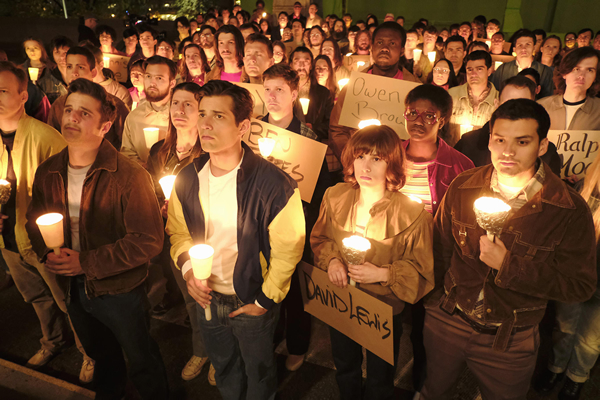
A scene from ‘When We Rise.’ (Photo courtesy ABC)
“When We Rise,” an ABC miniseries about LGBT rights that aired Feb. 27-March 3, drew so-so reviews from the mainstream press but was sharply criticized in the gay press.
Writing for the Blade, columnist Brock Thompson, said it had serious problems.
“Though I very much appreciate what ‘When We Rise’ was attempting, I couldn’t see past its problems,” Thompson said. “Its tone was preachy. Its messages about unity and strength in diversity landed like anvils. I stopped counting the clunky cliched lines like ‘we are stronger together,’ or ‘you don’t know how strong we are,’ or perhaps ‘strength. let’s get some and be strong with it together.’ All this gave way to some melodramatic moments. Beyond that, actors were switched out to play their role’s older counterparts, making the timeline rather confusing.”
Ratings, too, were weak for the series starring Guy Pearce, Mary Louise-Parker, Whoopi Goldberg and Rosie O’Donnell as Cleve Jones, Roma Pauline Guy, Pat Norman and Del Martin, respectively. Its first episode drew 3.26 million viewers to come in last of the four major networks for its time slot. Viewership dropped sharply thereafter. Scheduling was shifted after President Trump addressed Congress live on Feb. 28.
Helmed by multiple directors including writer Dustin Lance Black and Gus Van Sant, the eight-episode arc was framed as an epic, 45-year survey of the entire gay rights movement.
3. Chelsea Manning makes glam debut
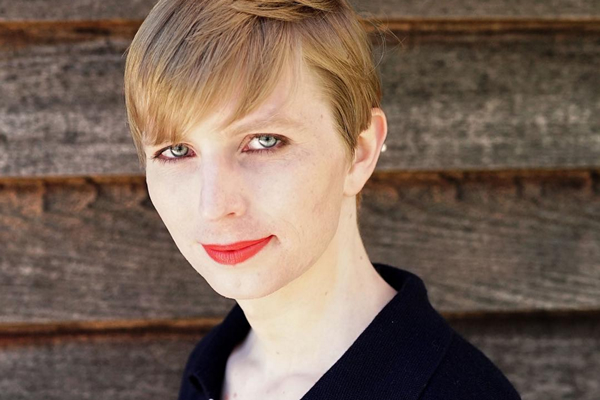
Chelsea Manning (Photo courtesy Instagram)
After being released from prison at Fort Leavenworth on May 17 after nearly seven years in prison for leaking 750,000 documents (some classified) to WikiLeaks, many were curious to see how Chelsea Manning would segue into civilian life.
Manning, 29, made her glam debut in the September issue of Vogue in a red Norma Kamall swimsuit and other high-fashion outfits with low-key styling by Phyllis Posnick and was praised for not being as sexualized and in-your-face as Caitlyn Jenner was when she made her debut in Vanity Fair in 2015.
“This is a far cry from the haughty, hyper-feminine Hollywood unveiling of Caitlyn Jenner,” wrote Robin Givhan in the Washington Post. She called Manning’s photos a “message of … accessibility, normalcy, calm.”
2. ‘Will & Grace’ and ‘Dynasty’ return
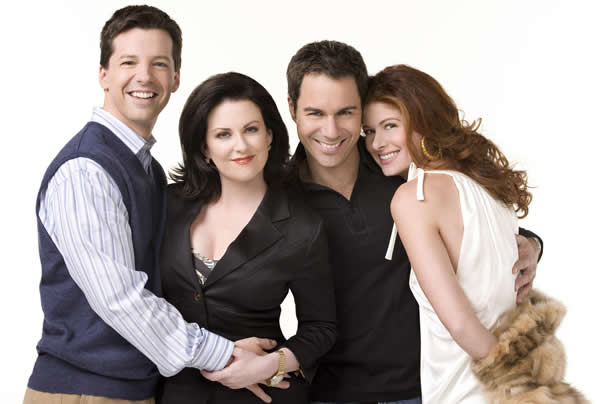
(Photo courtesy NBC)
After 11 years off the air, “Will & Grace” returned to NBC Thursday nights in September to launch a new, 16-episode run and ninth season.
The original cast — Eric McCormack, Debra Messing, Sean Hayes and Megan Mullally — were back after a planned one-off mini-episode that ran last fall timed to the presidential election.
The first new episodes of the show since 2006 found the familiar gang at the White House, navigating middle-aged gay dating, Jack discovering he’s a grandfather (with a gay grandson), Will making senior partner, an appearance by Beverley Leslie (Leslie Jordan) and many more hijinks.
Ratings have been solid — averaging more than 10 million viewers per episode — and reviews have been mostly positive.
A 10th season has already been approved.
Much less successful, however, has been the “Dynasty” reboot, which debuted in October on the CW with an all-new cast featuring James Mackay as Steven Carrington, Fallon’s (Elizabeth Gillies) gay environmentalist brother. Now his being gay is no big issue to dad Blake and gold digger Sammy Jo is now a gay man. Oh, and the Colbys are black this time.
Reviews have been highly mixed with Variety saying it “barely gets out of the gate before it begins to lose steam.” Ratings have been anemic, averaging less than a million viewers per episode.
1. ‘Moonlight’ wins Best Picture in shocking envelope mistake
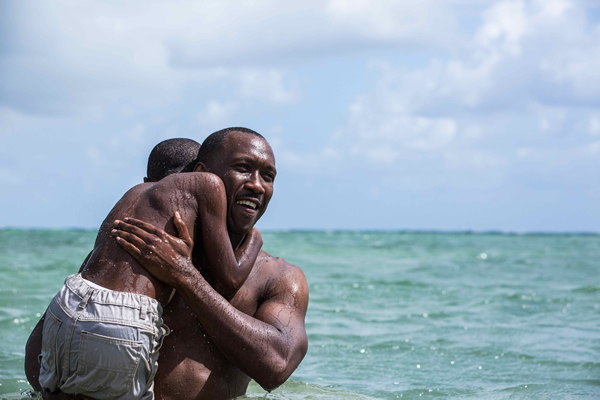
(Photo courtesy AMPAS)
It was supposed to be one of those nice little Oscar moments longtime fans of the Academy Awards cherish — beloved stars of yesteryear stride onstage reunited to give an award. Many stars have done it over the years — Jimmy Stewart and Kim Novak, Paul Newman and Elizabeth Taylor. This year it was Warren Beatty and Faye Dunaway, stars of 1967’s “Bonnie and Clyde.”
On the 50th anniversary of their cinematic classic, they came on stage at the Dolby Theatre on Feb. 26 to hand out the top prize of the evening. “La La Land” was announced as the winner but it quickly became apparent as its producers were giving their acceptance speeches that a mistake had been made and gay-themed “Moonlight” was the true winner.
Beatty and Dunaway had been handed the wrong envelope, a duplicate of the Best Actress envelope (“La La Land’s” Emma Stone had won that award). Upon seeing its contents, Beatty was flummoxed; Dunaway, thinking he was joshing for suspense, saw “La La Land” and announced it as the winner.
Dubbed the biggest gaffe in Oscar history, it turned out to be the mistake of PricewaterhouseCoopers’ managing partner Brian Cullinan who’d been Tweeting backstage. He and Martha Ruiz, who each had copies of the evening’s envelopes, were later relieved of any future Oscar duties though they kept their jobs.
“Moonlight” became the first LGBT-themed film and first film with an all-black cast to win Best Picture.
a&e features
Alexander Skarsgård describes ‘Pillion’ in 3 words: lube, sweat, leather
Highly anticipated film a refreshingly loving look at Dom-sub life
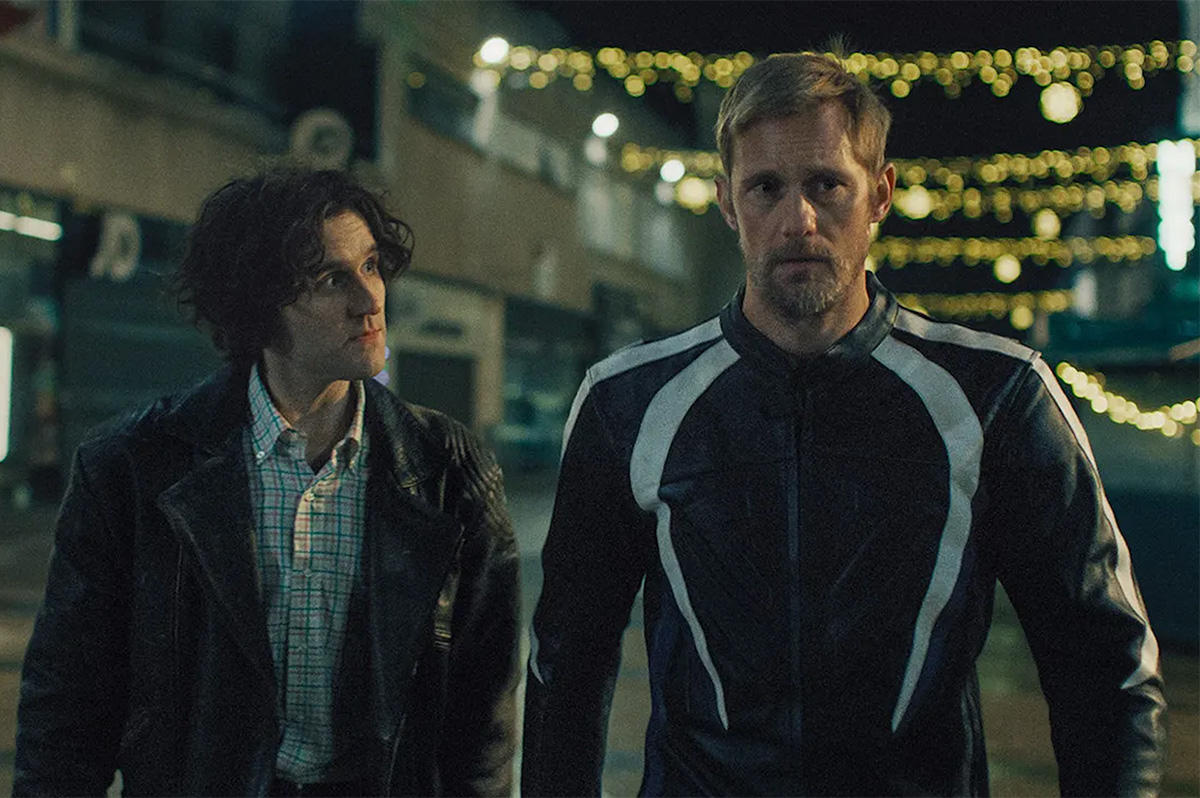
Whether you’ve seen him in popular HBO series like “True Blood,” “Succession,” and “Big Little Lies,” the dynamic Swedish actor Alexander Skarsgård has that smoldering gaze that immediately draws viewers in.
Following in the footsteps of his father Stellan, (who just won the Golden Globe for “Sentimental Value”) the Golden Globe, Emmy, and SAG winner Skarsgård continues to be an actor who is fearless in the roles he takes on.
That courageousness is evident in Skarsgård’s latest film, the BDSM black comedy “Pillion,”which he also executive produces. He plays Ray, the handsome, hyper-dominant leader of a gay bike gang. The film was written and directed by Harry Lighton, and is based on the 2020 novel “Box Hill,” by Adam Mars-Jones.
“This was a small film by a first time filmmaker and it wasn’t financed when I read it,” Skarsgård told journalists at a recent awards news conference. “And I felt that, if I could help in any small way of getting it financed, I wanted to, because I thought it was such an incredible screenplay and I believe in Harry Lighton so much as a filmmaker. And it felt tonally unlike anything I’d ever read. It was such an exciting, surprising read.”
Skarsgård was blown away by the quality of the unconventional script. “When I heard BDSM relationship, biker culture, I expected something very different. I didn’t expect it to have so much sweetness and tenderness and awkwardness.”
For the sex scenes and nudity with co-star, Harry Melling — who excels in his portrayal as Ray’s submissive Colin — Skarsgård talked very early on with Lighton about how he wanted to shoot those scenes, and why they were in the film.
“I often find sex scenes quite boring in movies because a lot of the tension is in the drama leading up to two people hooking up, or several people hooking up, as in our movie. But what I really enjoyed about these scenes — they are all pivotal moments in Colin’s journey and his development. It’s the first time he gets a blowjob. It’s the first time he has sex. It’s the first time he has an orgasm. And these are pivotal moments for him, so they mean a lot. And that made those scenes impactful and important.”
Skarsgård was happy that Lighton’s script didn’t have gratuitous scenes that shock for the sake of just shocking. “I really appreciated that because I find that when this subculture is portrayed, it’s often dangerous and crazy and wild and something like transgressive.”
He continued: “I really love that Harry wanted it to feel real. It can be sexy and intense, but also quite loving and sweet. And you can have an orgy in the woods, rub up against a Sunday roast with the family. And that kind of feels real.”
One of the obstacles Skarsgård had to work with was Ray’s emotionally distant personality.
“Ray is so enigmatic throughout the film and you obviously never find out anything about him, his past. He doesn’t reveal much. He doesn’t expose himself. And that was a challenge to try to make the character interesting, because that could easily feel quite flat…That was something that I thought quite a lot about in pre production…there are no big dramatic shifts in his arc.”
For the film, Lighton consulted the GMBCC, the UK’s largest LGBT+ biker club, attending their annual meetup at which 80 riders were present.
“Working with these guys was extraordinary and it brought so much texture and richness to the film to have them present,” said Skarsgård. “They were incredibly sweet and guiding with us — I can’t imagine making this movie without them. I’d go on a road trip with them anytime.”
Added Skarsgård: “To sum up ‘Pillion’ in three words: lube, sweat, and leather. I hope people will connect with Colin and his journey, and come to understand the nuance and complexity of his bond with Ray.”
This year is shaping up to be a busy one for Skarsgård. “Pillion” premieres in select cities on Feb. 6 and then moves into wide release on Feb. 20. After that for Skarsgård is a role in queer ally Charli XCX’s mockumentary, “The Moment,” which premieres at the Sundance Film Festival. HIs sci-fi comedy series, Apple TV’s “Murderbot,” which he also executive produces, will begin filming its second season. And this weekend, he hosts “Saturday Night Live.”
a&e features
MISTR’s Tristan Schukraft on evolution of HIV prevention
From ACT UP to apps, embracing stigma-free care
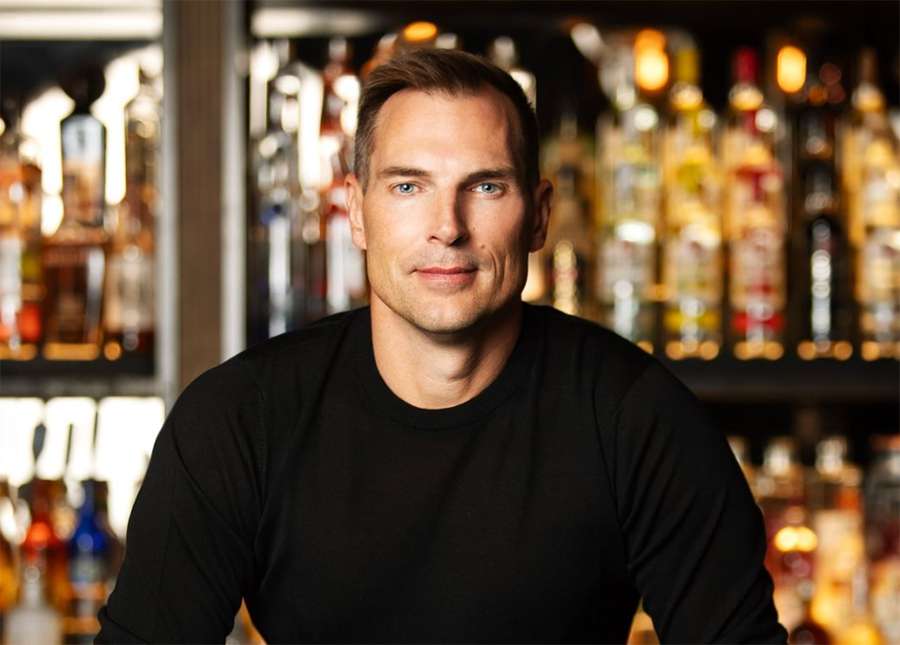
It was not too long ago that an HIV diagnosis was read as a death sentence. In its earlier decades, the HIV/AIDS crisis was synonymous with fear and loss, steeped in stigma. Over recent years, open conversation and science have come together to combat this stigma while proactively paving the way for life-saving treatments and preventive measures like PrEP. Now, in 2026, with discreet and modern platforms that meet people where they’re at in their lives, HIV prevention has evolved from hushed words of warning into something far more sex-positive and accessible. Game-changing services like MISTR are a testament to this shift, showing our community that healthcare doesn’t have to feel clinical or shaming to work. It can be empowering and, dare I say, celebratory.
Few people embody this evolution quite like Tristan Schukraft, founder of MISTR. With one hand in healthcare and the other high-fiving through queer nightlife, Schukraft gets that, from the bar to the bedroom and beyond, prevention happens in person and in real life. His approach has helped turn PrEP, DoxyPEP, and testing into normalized parts of our daily queer life, reaching hundreds of thousands of people across the US.
In our conversation, Schukraft shares candidly about stigma, policy, and why the future of sexual health depends on keeping it real.
BLADE: You have one hand in healthcare and the other in nightlife and queer spaces. Can you share with us how these two spheres impact and inform each other? How do they impact and inform you?
SCHUKRAFT: Honestly, for me, they’ve never been separate. Nightlife and queer spaces are where people meet, date, hook up, fall in love, and make friends. That’s real life. Being in queer spaces all the time keeps me grounded and reminds me who we’re building MISTR for.
BLADE: MISTR markets sexual health in a sex-positive, stigma-free fashion. Can you share with us how you measure the impact of this approach?
SCHUKRAFT: This year, we held the first-ever National PrEP Day. Dua Lipa performed, and Cardi B was there. After the event, Cardi B went on her Instagram live to encourage people to sign up for PrEP.
When you make sexual health stigma-free and sex positive, people talk about it. We see it in how people use the platform. When 700,000 people are willing to sign up, get tested, start PrEP, and add things like DoxyPEP, that tells us we’ve made it feel safe and normal instead of scary or awkward. And then we see it in the results. Since we expanded DoxyPEP, STI positivity among our patients dropped by half.
BLADE: How have you seen the conversation of sexual health in our LGBTQ+ community change in mainstream culture in recent years?
SCHUKRAFT: Ten years ago, nobody was casually talking about PrEP, and if they did, it likely referenced one being a Truvada whore. Now it’s part of the culture. Popstars like Troye Sivan post pictures of their daily PrEP pill on social media. Cardi B goes on Instagram Live telling people to get on PrEP.
For many sexually active gay men, taking PrEP is simply part of the gay experience. For people in more remote areas, it might not be as talked about. Particularly in rural or more conservative places, MISTR can be a life-changing option. No awkward visits to the family doctor or the local pharmacy where everybody knows your business. It’s all done discreetly online and shipped straight to your door.
BLADE: You have publicly argued that cuts to government HIV prevention funding are of high risk. Would you please elaborate for us on what those budget decisions mean on an individual level?
SCHUKRAFT: It means real people fall through the cracks. Someone doesn’t get tested. Someone waits too long to start PrEP. Someone finds out they’re HIV-positive later than they should have. Community clinics will be the hardest hit, especially those in underserved communities. The good news is that MISTR is ready to help people who might lose their access to care. All you need to do is sign up at mistr.com, and it’s totally free with or without insurance.
BLADE: From your (and MISTR’s) perspective, how do these funding cuts threaten ongoing efforts to end the HIV epidemic?
SCHUKRAFT: For the first time, we have all the tools to end HIV. If everybody who is HIV negative is taking PrEP and everyone HIV+ is virally suppressed, we can end all new HIV transmissions in the United States. We have everything we need today. All we need is to get more people on PrEP. Cutting funding risks losing that momentum. Ending HIV requires scale and consistency. Every time funding gets cut, you lose momentum, trust, and infrastructure, and rebuilding that takes years.
HIV transmissions don’t pause because budgets change.
BLADE: In our current climate of decreased federal investment, what role do you feel private healthcare and business should play in sexual health?
SCHUKRAFT: With reports that the current administration is considering cuts to HIV and prevention funding, we face a moment of reckoning. At the same time, some employers are seeking to exclude PrEP and HIV prevention from their coverage on religious freedom grounds. If these challenges succeed, and if federal funding is slashed, the consequences for public health will be devastating. But this is where the private sector must step up to fill the gap, bridge divides, and deliver results.
Businesses have the power and platform to normalize HIV prevention and drive measurable outcomes. At MISTR, we see firsthand what’s possible: since introducing DoxyPEP, STI positivity rates among our patients have been cut in half. But it’s not just about medication. It’s about messaging.
Our sex-positive, stigma-free marketing speaks directly to our community, making sexual health part of everyday life. No awkward doctor visits, no needles, no paperwork — just free online PrEP and STI testing, prescribed by real physicians and delivered to your door. That kind of impact could grow exponentially if more employers embraced this approach and made HIV prevention part of their employee wellness programs.
Employers, this is your call to action. Start by making sure your health plans cover PrEP and DoxyPEP. Partner with platforms like MISTR to give employees private, stigma-free access to care. Offer on-site testing. Talk openly about sexual health, not just during Pride, but every day of the year. This is not political — this is about protecting lives, strengthening communities, and building a healthier, more productive workforce. Because healthy employees aren’t just good for public health — they’re good for business.
When the private sector steps up, outcomes improve. And when businesses align with platforms like MISTR, scaling impact isn’t just possible — it’s happening.
BLADE: Has MISTR experienced any direct effects from these recent shifts in public health funding?
SCHUKRAFT: MISTR’s unique model is totally free for patients with or without insurance, and we don’t cost the government or taxpayers a penny. We are scaling up our efforts to reach people who might be losing their access or care.
BLADE: What would be your message to policymakers who are considering further cuts to HIV/AIDS programs?
SCHUKRAFT: During his first term, President Donald Trump committed unprecedented resources to the Ending the HIV Epidemic initiative here at home. Bipartisan support has shown what’s possible when bold leadership meets smart strategy. To policymakers: I urge you to reconsider any cuts to HIV prevention funding. This is not the time to pull back. It’s the time to push forward. Ending HIV is within reach — but only if government, private industry, and community organizations stand together.
BLADE: What is one perhaps overlooked win from last year that impacted you on a personal level?
SCHUKRAFT: Seeing our STI positivity rate drop by half after expanding DoxyPEP.
BLADE: Looking at the year ahead, what are MISTR’s most significant priorities for sexual health in 2026?
SCHUKRAFT: Expanding access, especially in the South and in communities that still get left out. Rolling out injectable PrEP. And just continuing to make sexual healthcare easier and more normal.
a&e features
Visible and unapologetic: MAL brings the kink this weekend
Busy lineup includes dances, pups, super heroes, and more
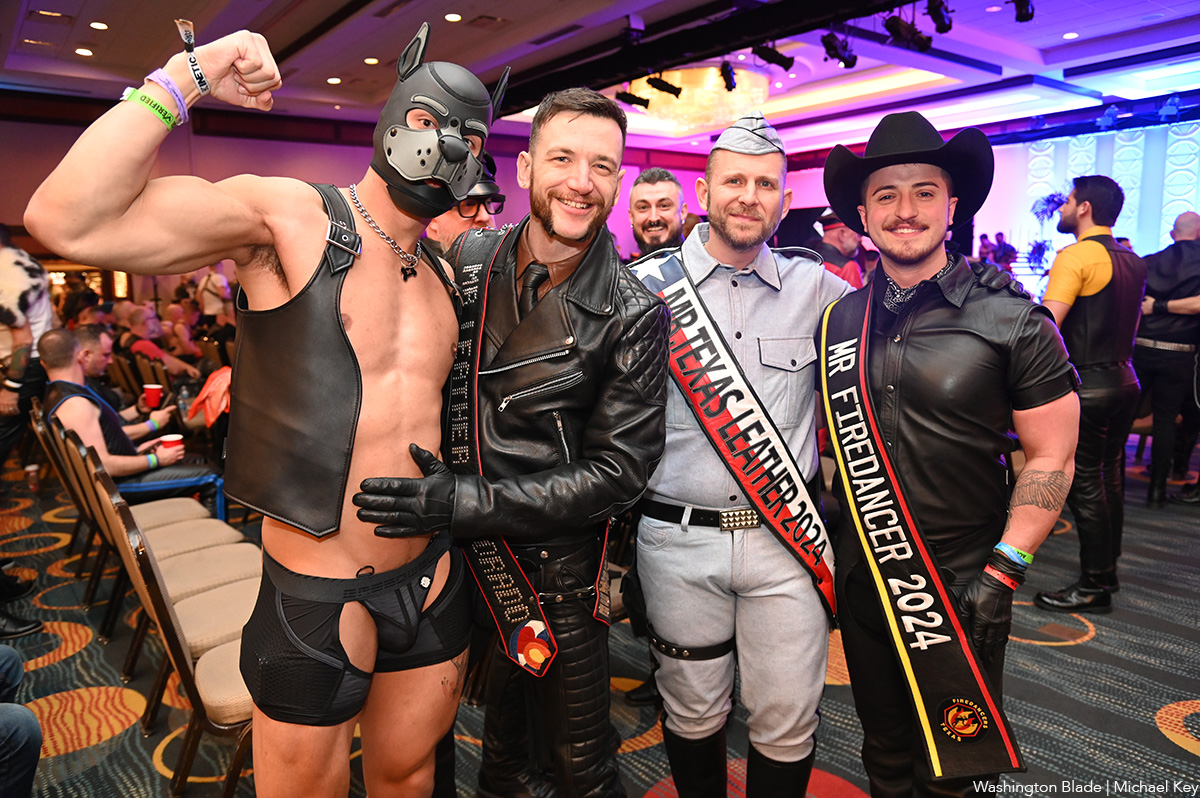
MLK Weekend in D.C. brings the annual Mid-Atlantic Leather (MAL) Weekend. Just a short walk from where Congress has been attacking queer Americans this year, MAL takes place at the Hyatt Regency Washington for several days of intrigue, excitement, leather, and kink.
The Centaur Motorcycle Club — one of several similar groups dedicated to leather in the country — has been hosting MAL in its current form for more than 40 years. Originally a small gathering of like-minded people interested in the leather lifestyle, MAL has grown to include a full four days of events, taking place onsite at the Hyatt Regency Washington (400 New Jersey Ave., N.W.). Select partner happenings take place each night, and many more non-affiliated events are scattered across the DMV in honor of and inspired by MAL.
MAL Weekend has become an internationally renowned event that celebrates fetish culture, yet it also raises funds for LGBTQ organizations, “reinforcing its legacy as both a cultural and philanthropic cornerstone of the global leather community,” according to MAL organizers.
During the day, MAL events at the Hyatt include workshops, social gatherings, shopping, and other in-person engagements for the community.
“The Hyatt underwent an extensive top to bottom renovation after last year’s event,” says Jeffrey LeGrand-Douglass, the event chair. The lobby, meeting spaces, guest rooms, and other areas have been updated, he notes, “so I am very excited for our guests to experience the new design and layout for the first time. And of course as with every year, we look forward to the contest on Sunday afternoon and seeing who will become our new Mr. MAL.”
In the evening, MAL hands the reins to partner KINETIC Presents, the D.C.-based nightlife production company. KINETIC will host four consecutive nights of high-production events that fuse cutting-edge music, immersive environments, and performance. This year, KINETIC is popping open doors to new-to-MAL venues, international collabs, play zones, and a diverse lineup.
According to KINETIC managing partner Zach Renovátes, 2026 is the most extensive MAL production to date. “The talent lineup is unreal: an all-star roster of international DJs, plus drag superstar performances at the Saturday main event,” he says.
Renovátes added that he’s “most excited about the collaborations happening all weekend — from bringing in MACHO from WE Party Madrid, to teaming up with local leather groups, to nonprofit partners, and Masc Diva [a queer nightlife collective].”
Official MAL events begin on Thursday with the Full Package/Three Day Pass Pick-Up from 5:30-8:30 p.m. at the Hyatt.
Thursday night is also the KINETIC kickoff party, called LUST. Running 10 p.m. – 3 a.m., it’s being held at District Eagle. DJ Jay Garcia holds it down on the first floor, while DJ Mitch Ferrino spins in the expansive upstairs. LUST features special performances from the performers including Serg Shepard, Arrow, Chase, and Masterpiece.
Renovátes notes that the LUST opening party at District Eagle coincides with the bar’s grand re-opening weekend. The bar will unveil its new permanent home on the renovated second floor. “it felt like the perfect place to start Mid-Atlantic Leather weekend — right in D.C.’s only dedicated home for kink communities,” he says.
After Thursday night, Friday is when daytime events begin at the Hyatt. The Exhibit Hall, on the ballroom level below the lobby, hosts upwards of 30 vendors, exhibitors, and booths with leather goods, fetish wear, clothes, toys, other accessories, providing hours of time to shop and connect with attendees and business owners. The Exhibit Hall will be open on Friday from 4-10 p.m., as well as on Saturday and Sunday afternoons.
DC Health is once again back at MAL, to provide preventative health services. In the past, DC Health has provided MPox vaccines, Doxy PEP, HIV testing, Narcan kits, and fentanyl test strips. This booth will be open on Friday 4-10 p.m.
Later, at 6 p.m., the Centaur MC is holding its welcome reception on the ballroom floor. After the Centaur’s Welcome Reception, the MIR Rubber Social is 8-11 p.m. A Recovery Meeting is scheduled at 10 p.m.
Many attendees enjoy visiting the guest room levels of the hotel. Note that to get in an elevator up to a hotel room, a staff member will check for a hotel room wristband. Non-registered guests can only access host hotel rooms if they are escorted by a registered guest with a valid wristband. Registered guests are permitted to escort only one non-registered guest at a time. Non-registered guests with a wristband who are already in the hotel before 10 p.m. may remain until midnight. However, non-registered guests without a wristband will not be admitted after registration closes.
Friday night, for the first time, KINETIC Presents is joining forces with WE Party to bring MACHO to Washington, D.C. This official MAL Friday event delivers two stages and two genres. On the UNCUT XXL stage, international Brazilian circuit superstars Erik Vilar and Anne Louise bring their signature high-energy sound. On the MACHO stage, Madrid’s Charly is joined by Chicago’s tech-house force, Karsten Sollors, for a blend of techno and tech house. UNCUT also features the XL Play Zone, a massive, immersive space exclusive to this event. The party takes place at the Berhta space from 10 p.m.-4 a.m..
“This year we’re bringing back the two-room format we debuted at WorldPride for both Friday and Saturday, so attendees can really tailor their experience — whether they’re in the mood for circuit or tech house.” says Renovátes.
Directly after Friday’s UNCUT XXL, UNDERWORLD Afters takes over District Eagle, from 3:30-8 a.m. International DJ Eliad Cohen commands the music.
Saturday, the Exhibit Hall opens earlier, at 11 a.m.. DC Health will also be back from 11 a.m. to 6 p.m.
Saturday is also time for one of the most anticipated events, the Puppy Mosh, running from 11 a.m. to 1 p.m. During the event, pup culture comes to life, when pups, handlers, and friends can enjoy an inclusive, safe pup zone. There is also a Recovery Meeting at 11 a.m., and the IML Judges Announcement takes place at noon.
The popular Super Hero Meet Up will be held 1:30 p.m. – 3 p.m., sponsored by One Magical Weekend, for cosplayers, comic enthusiasts, and their friends.
From 2-6 p.m., the Onyx Fashion Show will take place to showcase and highlight people of color in leather.
Finally, the Leather Cocktail Party – the original event of MAL – will be held 7-9 p.m. in the Ballroom. While this requires special tickets to attend, at 9 p.m. is the MAL cocktail party, which is open to wider attendees.
The last event of Saturday leaves the hotel, again a partnership with KINETIC. Kicking off at 10 p.m. and running until 4 a.m., it’s just the second time that KINETIC’s Saturday night party is an official MAL event and serves as the main weekend engagement.
Saturday night’s centerpiece is called KINK: Double Trouble. The night will feature a first-ever back-to-back set from international electronic music icons Nina Flowers and Alex Acosta on the Circuit/Tribal Stage. The other room – the Tech House Stage – curated by The Carry Nation and Rose, provides a darker, underground counterpoint, reinforcing the event’s musical depth and edge.
Beyond the DJs, KINETIC has called in the big shots for this party: “RuPaul’s Drag Race” legends Nymphia Wind and Plastique Tiara are set to headline. The party also takes place at Berhta.
Sunday, back at the hotel, there will be another Recovery Meeting at 10 a.m., and the Exhibit Hall opens again from 11 a.m.-5 p.m.
At 1 p.m., the anticipated and prestigious Mr. MAL Contest that celebrates the achievements of the leather community will be held in the Ballroom. This highly sought after title gives one man the power to become the Mid-Atlantic Leather man of the year. Sash and title winners must be (1) male, (2), a resident of North America, (3) At least 21 years of age; and (4) self-identify as gay. The first Mr. MAL was crowned in 1985. The Winner of Mr. MAL has the privilege of later competing in International Mr. Leather (IML) in Chicago on Memorial Day Weekend 2025.
From 4 p.m. to 12 a.m., MAL will hold its Game Night for the gaymers in attendance. There will also be a special screening of A24’s new film, “Pillion,” about a man who is swept off his feet when an enigmatic, impossibly handsome biker takes him on as his submissive.
Sunday closes with a community partner event produced by Masc Diva, featuring Horse Meat Disco with support from Coach Chris, at A.I. Warehouse in the Union Market district. It’s the same team that produced HMD during WorldPride at A.I. Warehouse.
Note that there are several types of passes for attendance to the hotel and parties. KINK VIP Weekend Passes include express entry, VIP areas, and enhanced amenities throughout the weekend, while MAL Full Weekend Package holders receive access to the official Sunday closing event.
At last year’s MAL events, KINETIC Presents raised more $150,000 for LGBTQ charities, and expects to match or exceed that impact in 2026.
Renovátes stated that “now more than ever, it’s important to create safe, affirming spaces for our community — but it’s just as important to be visible and unapologetic. We want to make it clear that the LGBTQ+ and leather communities aren’t going anywhere. We’ve fought too long and too hard to ever feel like we have to shrink ourselves again, no matter what the political climate looks like.”
In addition to the KINETIC events, various LGBTQ bars will hold parties celebrating the theme of the weekend. For example, Kiki, located on U Street NW, is hosting a party called KINKI, hosted by DJ Dez, on Saturday night. Sister bar Shakiki, on 9th Street NW, is hosting a party called Railed Out, a fetish-inspired party that features a play zone, on Thursday night. Flash, on U Street NW, will hold its infamous Flashy Sunday party to close out the weekend.

